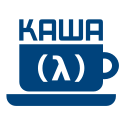Kawa (Scheme implementation)
 | |
| Developer(s) | Per Bothner |
|---|---|
| Stable release | 2.1
/ October 26, 2015 (w/R7RS compatibility) |
| Repository | |
| Written in | Scheme / Java |
| Operating system | Cross-platform |
| Platform | Java Virtual Machine |
| Type | Scheme programming language interpreter/compiler |
| License | MIT License |
| Website | https://www.gnu.org/software/kawa/ |
Kawa is a language framework written in Java that implements the programming language Scheme, and can be used to implement other languages. It is a part of the GNU Project.
The name "Kawa" comes from the Polish word for coffee – a play on words, since Java is another familiar name for coffee.
Integration with Java
Besides using the Scheme programming language, Java object fields and methods can be accessed using code like this:
(invoke object 'method argument ...)
This will invoke a Java method, and does the same thing as object.method(argument, ...) in Java.
An object's fields can be accessed with:
object:field-name
or
(invoke object 'field)
Static (class) methods can be invoked with the function "invoke-static".
Kawa can be extended with Java code (by creating scheme functions in Java), as well as combined with other JVM implementations.
How to use
To run Kawa on GNU/Linux:
$ export CLASSPATH=$CLASSPATH:/path/to/kawa/kawa-1.10.jar
$ java kawa.repl
To compile a Scheme file to a class file, the -C parameter is used:
$ java kawa.repl --main -C file.scm
This will produce "file.class", which can be run by typing "java file". It is also possible to create an applet or servlet (to compile a servlet, "servlet-xxx.jar" must be in the CLASSPATH variable).
